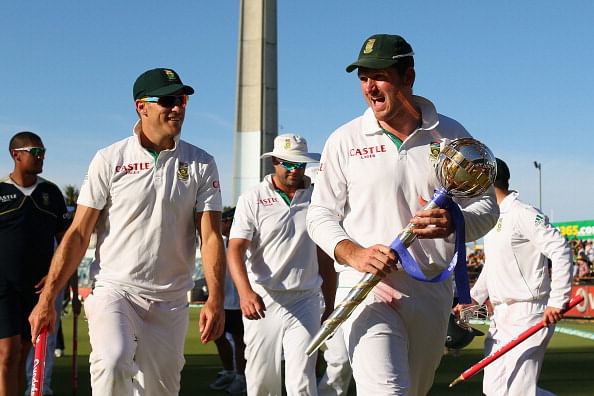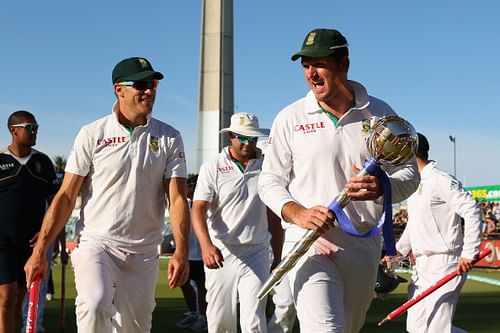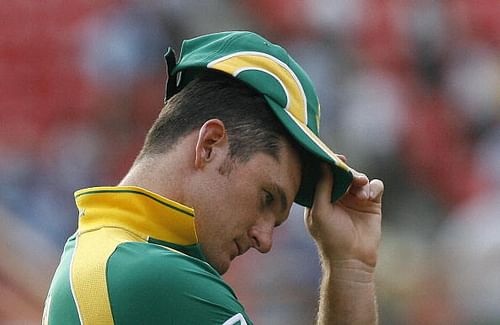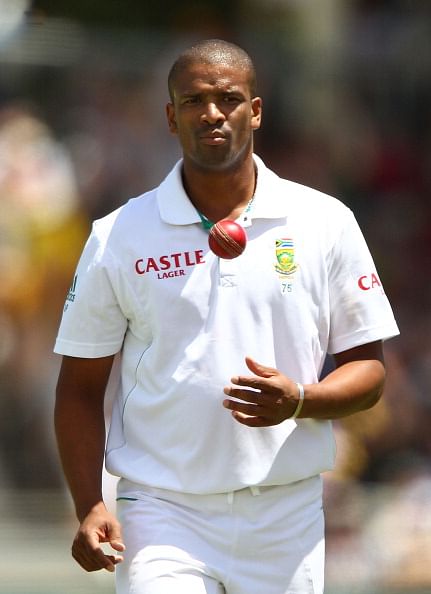
From good to great: Can the current South Africa team make the transition?

“Great men are not born great, they grow great…” - Mario Puzo, The Godfather.
What is true of individuals is true for sporting units as well. Only when a group of talented individuals start achieving feats that are considered to be rare/impossible to achieve, do they start getting recognised as a great team. On the cricket field, the impressive performance of the current South Africa squad has fuelled speculations as to whether they can be mentioned in the same breath as the West Indies from late seventies to early nineties and Australia from 1997-2007.
But it can be quite tricky to distinguish between a good team and an invincible one. Mia Hamm, legendary soccer player of the United States, had once said ‘You can’t just beat a team, you have to leave a lasting impression in their minds so they never want to see you again.’ It is this ability to create a lasting impression in the minds of the fans and opposition players that propels a good team to rise a step up and get hailed as a great unit.
It would be unfair to suggest ‘how’ a team should strive towards achieving that lasting impression; indeed each great squad can design its unique imprint, but we can certainly list down ‘what’ a team should achieve to make a strong case for its greatness. These are:
Consistent victories ‘home and away’ against all Test playing nations twice
Test cricket being the pinnacle of cricketing contests, it is imperative that any team that aspires to be labelled as great must be able to assert their supremacy in this format against all opponents and across all conditions for a considerable stretch of time. So in the next five years if the Proteas manage to conquer each of the other eight Test playing nations, twice at home and twice in the opposition’s den, they would take a giant stride towards achieving greatness.
Ruthless domination – try to win every match, not just the series
While winning Test series’ on a consistent basis would earn the respect of the opposition sides, but to generate fear in the opposition’s ranks a great squad has to give the impression that they are on a mission to defeat and humiliate their opponents in every single encounter. Back in 1984, the legendary West Indies squad gave a good example of this indomitable desire to win when on the final day they successfully chased down a target of 344 in just 66 overs at Lords at an astonishing run rate of 5.2. Similarly, Australia between 1997 and 2007, went on to win 16 Test matches in a row twice. And they were able to do it because while batting they maintained a run rate of 4 and above so that their bowlers always had ample time to dismiss their opponents twice. The Saffers would have to display similar aggression and get similar results to make a name for themselves.
Domination in all formats of the game – Tests, ODIs and T20
While Test cricket is a connoisseur’s delight, a truly great team would be able to extend its domination in the limited overs format as well. Australia, for example, in its hey days, was on a thirty-four match unbeaten streak en-route to winning the ODI World Cup thrice in a row. Similarly. the Lloyd-led West Indies squad made three successive entries to the World Cup final, winning twice. The rainbow nation too, would have to develop a penchant for collecting ICC silverwares if they want to enlist their squad as a great one in the minds of cricket experts and followers alike.
Things they need to do to achieve greatness
Win ICC Events

The pedigree of the South African cricketers has never been doubted ever since they made their re-entry to International cricket in the early nineties. However, triumph in any major ICC event has eluded them. Detractors were quick to attribute this failure to a fragile mindset that fails to handle pressure on the biggest stage. Consequently, they were dubbed ‘chokers’. And the South Africans have done little to get rid of this ignominious tag in the manner in which they have exited from some of the major limited overs tournaments in the past. It is time to change all that.
The next T20 World Cup in Bangladesh, Champions Trophy in England this year and of course the ODI World Cup in 2015 in Australia would give them a great chance to bury this ghost. Given the inherent unpredictability of the shorter formats, it may be difficult to win all three events mentioned above but a team that would want a special mention in the annals of cricket history must be able to win atleast two of these events.
Ability to take wickets with the old ball
While the current squad can boast of one of the finest seam bowling attacks ever, of late it has been observed that their potency decreases considerably once the ball loses its shine and when the pitch does not aid quick bowlers. This is exactly the type of conditions they are likely to encounter when they visit the Asian sub continent.
To be effective there, one of two things needs to be done. First, the fast bowlers need to master the art of reverse swing to telling effects. Second, a wicket taking spinner is inducted in the playing eleven.
Adjust to a team without Kallis
Any team that has an all rounder of Kallis’ pedigree in its arsenal is truly blessed. And the South African cricket establishment has reaped such fortunes over the past fifteen odd years. However, Kallis is past 37 and it would not be pragmatic to expect Kallis to be around for another five years. It would be foolhardy to suggest for Kallis’ ‘replacement’, but how they adjust their squad to fulfil the void left by this all time great would be a deciding factor in South Africa’s odyssey towards immortality in the cricket folklores.
Manage workloads of key players without compromising results

Unlike the earlier generations, the amount of cricket played by individual players in a year has gone up manifold. Apart from the three formats of the game played internationally, the players also take part in different domestic T20 leagues across the globe, most notably the IPL, hosted by BCCI.
While great players can easily get into the mould of any format in terms of mental adjustment, the body may find it more difficult to cope with the physical rigours. It is up to the South Africa team management to keep the key players in prime shape for key encounters. Of particular concern should be A.B. De Villers, specially after he has doubled up as the wicket keeper in Tests, because he also happens to play all formats of the game for South Africa and is a prominent feature of the IPL and Champions League as well. Similarly, Philander, in his brief international stint, has proved to be injury prone.
While rotation seems to be the most likely solution, results can’t be compromised. This is where bench strength would be tested. It would be pertinent to remember at this juncture how Shane Warne had to make a sudden exit from the 2003 World Cup and Hogg, his replacement, was more than impressive on account of his 13 scalps from 9 matches in the premier event. Similarly, McGill was more than an able replacement for Warne in Tests, while players of the calibre of Langer and Katich fought it out to partner Hayden at the top of the batting line up. While good players bring success in the immediate terms, it is the presence of a solid bench that ensures triumph on a consistent basis over a period of time.
Fringe players must step up
A team should always be more than sum of all its parts. While some of the parts (read: players) are truly exceptional, there are others who still have to prove that they belong to this team. Case in point can be Alviro Petersen. This diminutive opener averages less than 40 after his first 23 Tests. While that does not imply that he is bad, it only suggests that he has to step up his game by a few notches to fit in a side that has the potential to become great. Similarly, there are others like Du Plessis, Dean Elgar and Robin Peterson who must prove themselves to be champions in their own rights, because an invincible squad cannot appear to have chink in its armour.
South Africa has been a wonderful addition to the cricket fraternity since their readmission in the early nineties. They have played a wonderful brand of tough competitive cricket in the last two decades, have gifted several superstars to World Cricket and proved themselves to be wonderful hosts in several ICC events. But somehow greatness has proved to be elusive. The next five years may change that.